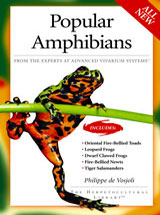If a frog or salamander eats but loses weight, has watery feces, or is active but eats poorly, parasites are a possible cause of disease.
 |
It doesn’t make economical sense to pay for veterinary checkups for parasites in an amphibian that you paid less than $10 for, so many amphibian hobbyists adopt a wait-and-see attitude. If a frog or salamander eats but loses weight, has watery feces, or is active but eats poorly, parasites are a possible cause of disease. Obviously, the most effective way to address a potential parasite problem in a frog or salamander is to consult a qualified veterinarian and have a fecal exam performed. Another option is to buy a microscope along with books or manuals that give instructions for performing simple fecal exams.
Two groups of parasites are routinely treated by amphibian hobbyists. Nematode worms are parasites that can be easily treated with orally-administered fenbendazole (Panacur) at 100 milligrams (mg) per kilogram (kg), repeated in two weeks. Various flagellate protozoans and amoeba are treated with metronidazole at 100 mg per kg, repeated in two weeks. It is also effective against anaerobic bacteria. However, it should be noted that many amphibians normally harbor some flagellates as part of their typical intestinal flora, so treatment for these parasites is recommended only when a frog or salamander is showing signs of illness and flagellate numbers are unusually high.
Because fenbendazole is also effective against certain flagellate protozoans (if administered daily for several days at half the recommended dosage), it is frequently used as a first course of parasite treatment. Often enough, home treatment for these parasites causes an improvement in frogs that fail to maintain weight and are just slightly ill. Ivermectin (Ivomec injected once subcutaneously at 0.2 mg per kg), another powerful parasiticide for treating nematodes, has also been used successfully orally, subcutaneously, and topically. However this potent drug must be dosed carefully because it has a narrow margin of safety.
Amphibians might also harbor other parasites like tapeworms and flukes, but there is relatively little information available on effective treatment. Praziquantel (Droncit) has been used with some success to treat tapeworms in various amphibians and can be administered both orally and topically. Consult other amphibian hobbyists or a qualified veterinarian (very few are experienced with amphibians) before attempting home treatment with any parasiticide.


